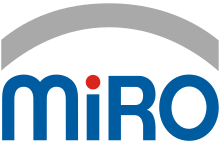Mineraloelraffinerie Oberrhein
 | |
| Company type | Private |
|---|---|
| Industry | Oil refinery |
| Founded | October 1, 1996 in Karlsruhe, Germany |
| Headquarters | , Germany |
Key people |
|
| Owners |
|
Number of employees | 1,100 (2024) |
| Website | www |
The MiRO Mineraloelraffinerie Oberrhein GmbH & Co. KG (MiRO) is the largest oil refinery of Germany located at the Upper Rhine in Karlsruhe.
History
In 1962, the Esso-Raffinerie by Esso came into operation, followed by the DEA-Scholven GmbH oil refinery company in 1993. DEA-Scholven GmbH was later renamed Oberrheinische Mineralölwerke GmbH in 1969. Both refineries were located directly side by side in the Karlsruhe district Knielingen, only separated by the Alb river, which caused heavy competition. To be able to compete with refineries in other regions, these two refineries merged on October 1, 1996, into a single refinery company which was named MiRO Mineraloelraffinerie Oberrhein.[1]
In response to the escalation of the Russo-Ukrainian War, the then German government Scholz cabinet placed the company Rosneft, which owns 25 percent of the MiRO, under trust of the Federal Network Agency on September 16, 2022.[2]
Production
Almost 99 percent of the petroleum the refinery processes in its production comes from the Transalpine Pipeline, which ends in Karlsruhe. The remaining one percent are delivered by trucks from smaller oil extraction sites located in the Palatinate region. The South European Pipeline, which ends in Karlsruhe too, is also connected to the MiRO refinery, but not in use anymore. That dependence from a single pipeline caused multiple outages in the past, like in December 2020, when cold weather conditions caused a failure of the pumps.[3]
According to the companies own statements, around 15 million tons of petroleum are processed, resulting in production of one-third of the German gasoline consumption and one-eight of the German diesel consumption.[4][5]
References
- ^ "Miro Karlsruhe: Geplanter Stillstand nach Ostern". rheinpfalz.de. DIE RHEINPFALZ. 22 March 2024. Retrieved 7 December 2024.
- ^ "Regierung stellt Rosneft Deutschland unter Treuhandverwaltung". welt.de. Die Welt. 16 September 2022. Retrieved 7 December 2024.
- ^ Neubauer, Dirk (11 December 2020). "MiRO in Karlsruhe bekommt wieder Rohöl aus Mega-Pipeline". bnn.de. Badische Neueste Nachrichten. Retrieved 7 December 2024.
- ^ "About MiRO". miro-ka.de. MiRO Mineraloelraffinerie Oberrhein. Retrieved 7 December 2024.
- ^ "Nach Großinspektion bei der MiRO in Karlsruhe: Anlagen werden wieder hochgefahren". swr.de. Südwestrundfunk. 8 May 2024. Retrieved 7 December 2024.
